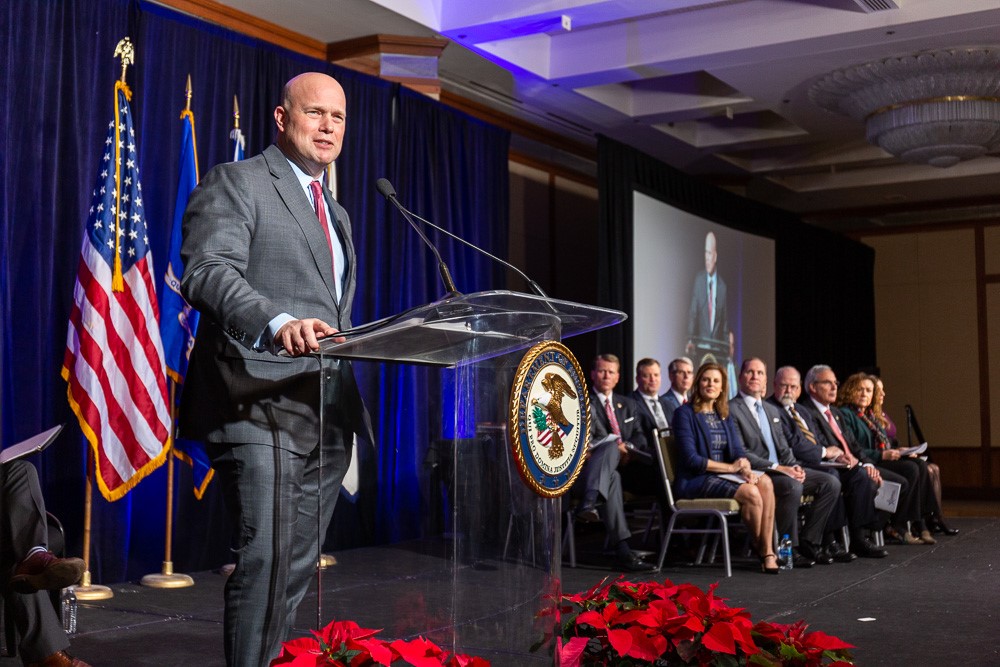In Praise of Justice Department Independence Norms (and of Matthew Whitaker)
When President Trump appointed the unqualified Matthew Whitaker as acting attorney general on Nov. 7, 2018, many prominent people believed that the country faced yet another “constitutional crisis” point.

When President Trump appointed the unqualified Matthew Whitaker as acting attorney general on Nov. 7, 2018, many prominent people believed that the country faced yet another “constitutional crisis” point. The main underlying worry was that Whitaker, who had been critical of the Mueller investigation before assuming the acting attorney general role, would act at Trump’s behest to undermine or shut down the Mueller investigation. The worries seemed plausible. Whitaker possessed the authority, in theory, to fire Mueller, control his budget and reverse his important legal decisions. And Trump seemed to think that Whitaker was a loyalist who would look out for his interests. “I really believe he’s going to do what’s right,” Trump told Fox News’s Chris Wallace.
But during Whitaker’s tenure, the Mueller probe pushed forward to the point where CNN is now reporting that Mueller is soon wrapping it up. Here in a nutshell is what we know happened during Whitaker’s tenure. A few weeks after Whitaker assumed office, Trump’s former lawyer Michael Cohen pleaded guilty to lying to Congress about Trump’s “Moscow Project,” among other Trump-Russia links. In December, New York federal prosecutors filed a sentencing document that basically accused the president of directing Cohen’s criminal campaign violations. Mueller’s office continued to push hard against former Trump campaign manager Paul Manafort. And, of course, last month Mueller indicted Trump pal Roger Stone for witness tampering, obstruction and false statements.
At a hearing before the House Committee on the Judiciary on Feb. 8, Whitaker testified that he had not interfered with the Mueller investigation. “We have followed the special counsel’s regulations to a T,” Whitaker said. “There has been no decision that has required me to take any action, and I have not interfered with the special counsel’s investigation in any way.”
On Feb. 19, the New York Times reported, based on anonymous sources, that Trump asked Whitaker “whether Geoffrey S. Berman, the U.S. attorney for the Southern District of New York and a Trump ally, could be put in charge of the widening investigation” against Trump interests. The Times does not say what Whitaker did in response, but it does say that Trump “soon soured on Mr. Whitaker” and that Trump “complained about his inability to pull levers at the Justice Department that could make the president’s many legal problems go away.” And it adds that “there is no evidence that [Whitaker] took any direct steps to intervene in the Manhattan investigation.”
Whitaker’s failure to intervene against Mueller is not what is primarily being reported in light of the Times story, however. Rather, many commentators are focusing on Whitaker’s supposed statements to colleagues that he saw his job at the Justice Department as in part to “jump on a grenade” for the president. And more than anything else, commentators and politicians are asking whether Trump’s alleged request to Whitaker about Berman is consistent with Whitaker’s testimony earlier this month that “at no time has the White House asked for nor have I provided any promises or commitments concerning the special counsel’s investigation or any other investigation.”
Through a Justice Department spokesperson, Whitaker has made clear that he stands by his testimony despite the Times story. There will be time enough to sort this issue out. I just want to emphasize that by every public indication, including the Times story, Whitaker has not, as so many feared, interfered in any way with Mueller’s investigation or that of the Southern District of New York.
This is yet another extraordinary testament to the remarkable power and resilience of Justice Department norms of independence, about which I have written a lot. I think we have to assume that Whitaker’s non-interference is also at least in part a tribute to his professional integrity. Some may speculate that Whitaker was restrained by the powerful Justice Department norms and was simply acting prudently in the face of these norms, and not out of a commitment to principle. Maybe, maybe not. But these norms don’t always operate successfully on every Justice Department official. So I think we need to give Whitaker at least a little credit based on current information. In any event, the Whitaker episode can now be added to the long list of cycles of panicked reaction to Trump’s efforts to control the Department of Justice.





